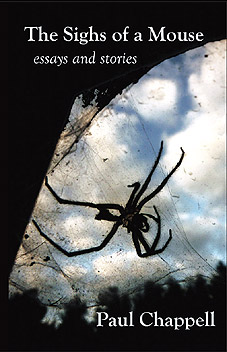|
This is a very unusual book in that it was written by a man who took his own life in July 2013, and the essays and stories it contains chronicle his descent into depression, or if you are loath to attach a medical label to his state of mind, despair. They take us through two unsuccessful attempts to end it all, the second of which leaves him hospitalised for a few days and, in his own estimation, robs him of the remaining shreds of his dignity.
All of the various short pieces that make up the book originally appeared on the writers' websites ABC Tales and UKAuthors.com, and they take us almost to the very moment of his final high-speed car-drive into a brick wall and hence eternity.
I should perhaps say at the outset that his declining fortunes and mental state are not the only topics Chappell writes about in this collection, because it spans a long writing career, and many of the essays and stories deal with different subject matter entirely, and are merely first class examples of a fine writer's work, many of them very funny, all of them intelligent and well-crafted. Their presence makes the rest of the collection all the more poignant, his untimely death all the more tragic. Indeed I want to stress that even if there had been no suicide and no tragic outcome to Chappell's life I would still want to recommend this book as a thoroughly witty, entertaining and thought-provoking read.
The author had good reasons for his decision to give up on life, and he explains them at length, and often with a stunning irony that propels the narrative into comedy. His house and possessions seized by the bailiffs, deep in debt, alone, hungry and denied state benefits, shamefully neglected by the people and institutions that he has turned to for support, he decides that suicide is simply his best option. There is nothing that comes across as inevitable about this decision, you or I or indeed he might have decided differently. It seems to be a free and rational choice.
In saying this I don't mean to deny the reality of the 'black dog' (depression) that Chappell could not escape – it is simply that the illness comes across as one factor but not the only one influencing his decision. Had he been given just a little more support both in practical ways and in terms of understanding and treating his illness his story might have had a very different ending. This book is a devastating indictment of the mental health care professionals and the other public servants entrusted with the management of this man's illness. Coming so close on the heels of the Stafford Hospital scandal let us hope that the book gives those in the relevant professions pause for thought and causes them to re-examine their working practices and their attitudes to people suffering mental distress. Chappell makes it clear repeatedly that this is a large part of his reason for recording his thoughts. If it happens then he will not have died in vain.
'When well-meaning people say, “Why don’t you...?” and then name something that they believe should make me happy, I want to kill them very hard. It isn’t their fault, they don’t know any better, so I usually let them live. But let it be known, now and for all time, that such suggestions are not helpful.'
With nothing in all the world capable of making him happy, Chappell decided that the rational course was to leave it, to experience nothing was preferable to experiencing only misery. In this his logic seems impeccable. The world owes him a debt of gratitude not only for the wonderful stories and essays he has left us but for the insight he has provided into the thought processes that lead a person to that final dark act. I hope this book will be widely read and thought about by everyone whose lives touch upon those experiencing mental distress.
SEND ME AN EMAIL 
|












